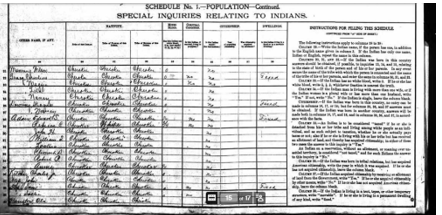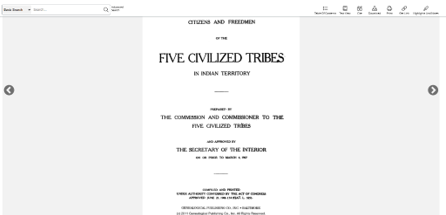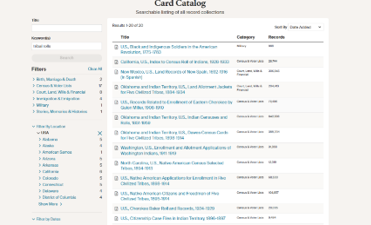Discovering Native American Roots
Whether you seek to confirm the validity of family legends, enroll as a member of one of the 574 Native American tribes in the U.S., or connect with your family’s history and culture, we have many valuable research tools to help you. The library provides free access to books and internet databases that will help answer your questions about your family and heritage.
Where to begin
The common genealogy research advice to begin with yourself and go backwards through time will serve you well when you search for Native ancestors. With recent family members like your parents or grandparents, you’ll likely have more records and memories of their lives. Some helpful basic pieces of information about ancestors are names (including maiden names for women), as well as where they were born, married and died. Try to find the dates of these major life events too. Knowing where Native American family members lived is especially helpful since that will allow you to narrow down which tribes they were part of.
Learning more about the history of your tribe(s)
Once you have a good idea where your family was located, do some research on the Native American tribes who lived there. Keep in mind that with many tribes, the question of location is complicated by a history of forced displacement and removal from their original lands. For example if you have Cherokee ancestors, they may have lived in Georgia before the Trail of Tears of the 1830s and in Oklahoma afterwards. Doing research on the Native American history of where your family lived and the people who called that land home can narrow down which tribes might be a part of your heritage. Books from our Topeka Room genealogy collection and our nonfiction wing can help you learn more about this history. Search our catalog or ask anybody at our service desks for help finding relevant books.
Government documents and Censuses

A 1900 census record shows tribal information. Image courtesy of Ancestry.
Records from the federal government can be helpful in your research. An excellent place to start is the U.S. Census of 1900 (the 12th federal census), since it asked questions about tribal affiliation. Ancestry Library Edition (in-library use only) and FamilySearch will both allow you to search these census records, and you can check the “Special Inquiries Relating to Indians” schedule to find their tribe. Our genealogy reference section also hosts indexes to many federal and state censuses. Tribal rolls, which were created by the government to record members of federally recognized tribes, can also your research. The library’s genealogy reference collection includes indexes to some of the rolls.
Useful online databases
Your library card connects you to Ancestry Library Edition (in-library use only) and Fold3, which allow you to search tribal records. Ancestry has an extensive, keyword-searchable catalog you can filter by location and time. Fold3, a sister site of Ancestry, mostly includes military records but has a “non-military” section with a searchable collection of Native American records. (Find tips on using Fold3.) Gale’s Genealogy Connect database also hosts a Native North American records section includes censuses, wills and tribal rolls in ebook form. Gale also allows you to download and annotate these records. Your library’s genealogy team can assist you with using these databases for your research. We hope you can use our resources to form a deeper understanding of your family history and discover the answers to your questions.

An ebook copy of the Dawes Tribal Rolls from Gale Genealogy Connect. Image courtesy of Gale Genealogy Connect.

Search results for "tribal rolls" in Ancestry's card catalog. Image courtesy of Ancestry.















